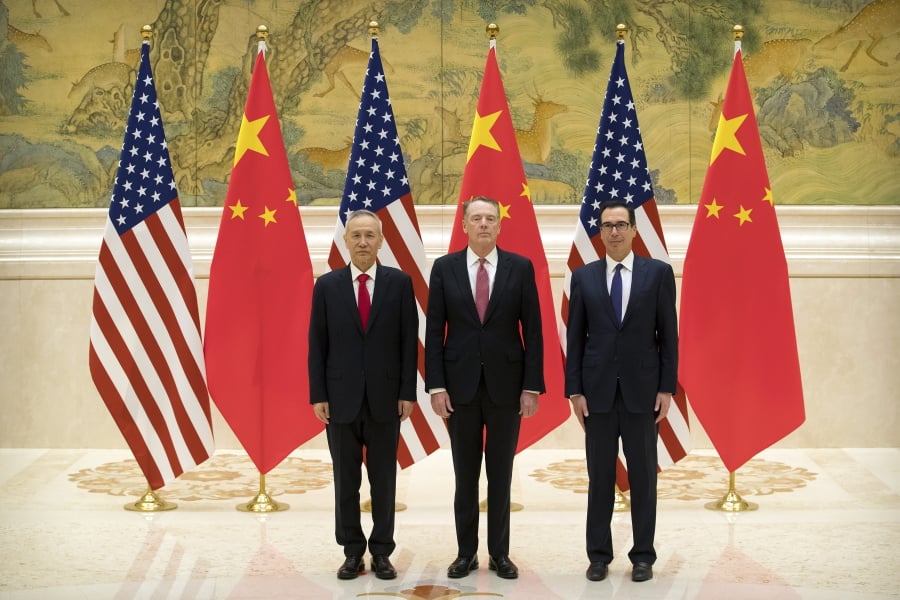BEIJING — U.S. and Chinese negotiators opened talks Thursday on a sprawling trade dispute as Beijing reported its January exports rebounded despite President Donald Trump’s tariff hikes.
Trump said earlier the talks could help decide whether he escalates the fight over China’s technology ambitions by going ahead with more penalty duties March 2 on $200 billion of Chinese goods.
The battle between the two biggest economies has fueled fears it will drag on weakening global growth. China’s economy grew at its slowest pace in three-decades last year, adding to pressure on communist leaders to reach a settlement.
Both sides have expressed optimism but released no details. U.S. Trade Representative Robert Lighthizer and his Chinese counterpart, Vice Premier Liu He, shook hands at the start of the meeting at a government guesthouse but said nothing to reporters.
The U.S. delegation also includes Treasury Secretary Steven Mnuchin and David Malpass, a Treasury undersecretary who is Trump’s nominee for World Bank president.
On Tuesday, Trump said that while he is not inclined to extend the deadline, he might let it “slide for a little while” if talks go well. Earlier, the White House called March 2 a “hard deadline.”
Economists and business groups say the planned two days of negotiations allow too little time to reach a final settlement, but Beijing hopes to persuade Trump enough progress is being made to forestall the new tariff hikes.
There was no indication whether negotiators are making progress on the thorniest dispute: U.S. pressure on Beijing to scale back plans for government-led creation of Chinese global leaders in robotics and other technologies.
A Ministry of Commerce spokesman, Gao Feng, told reporters at a regular weekly briefing that he had no details on the status of the talks.
Meanwhile, customs data released Thursday showed Chinese exports in January rose 9.1 percent from a year earlier, recovering from December’s 3.5 percent decline.
Exports to the United States sank 2.4 percent, squeezed by Trump’s tariff hikes on billions of dollars of Chinese products. Imports of American goods plunged 41.2 percent, reflecting retaliatory Chinese duties and orders to importers to find other suppliers.
The fight reflects growing frustration among Beijing’s trading partners over official plans to subsidize and promote fledgling Chinese technology industries. Washington, Europe, Japan and other governments say those violate Beijing’s market-opening obligations. Some American officials worry they might erode U.S. industrial leadership.
Trump raised tariffs in July over complaints Beijing steals or pressures companies to hand over technology. The dispute includes cyber-spying traced to China, the country’s multibillion-dollar trade surplus with the United States and support for state industry.
Beijing has offered to narrow its trade surplus by purchasing more American soybeans, natural gas and other exports. Butit also has resisted pressure to cut back development plans it sees as a path to prosperity and global influence.
A deal on changes in Chinese industrial and market regulations might be possible in three months, said Yu Miaojie, a Peking University economist. But he said Beijing likely will insist it is entitled as a developing country to retain protection for its industries.



